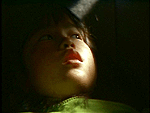An unidentified widow (Hikari Ishida) sits in the kitchen of the Sato home bearing a keepsake from her late husband in the desperate hope that her psychic medium, Junko (Jun Fubuki) can somehow connect her to him and help resolve her own conflicted emotions on the prospect of marrying another man. Soft-spoken, deliberative, and perhaps intentionally vague in her seemingly enlightened queries, Junko’s role is that of a surrogate psychotherapist, echoing her client’s ambivalent sentiment through inverted responses and patient, introspective silence. Nevertheless, Junko’s paranormal vocation seems to have been borne more out of listlessness and an attempt at social re-engagement than financial necessity as she impulsively tells her devoted husband, a sound engineer named Sato (Kôji Yakusho) one evening that she is ready to return to work. A subsequent, cursory episode alludes to the reason for her self-imposed exile as Sato searches for a child’s beverage training mug, reinforcing the theme of a lost child that has deeply marked – and continues to haunt – their marriage. Meanwhile, in another part of town, the police are baffled by the case of a nebulous and predatory stranger who has abducted a young girl at a playground under the ruse of her mother’s illness. Working with a university professor (Ittoku Kishibe) in order to create a psychological profile of the perpetrator, the professor, in turn, convinces the lead detective (Kitarou) to enlist Junko’s assistance, providing her with the child’s handkerchief in order to aid in the search. A loose adaptation of the novel by Mark McShane, Séance on a Wet Afternoon, Séance is a taut, atmospheric, and meticulously constructed psychological study of surrogate guilt, emotional co-dependency, personal conscience, and vanity. Kiyoshi Kurosawa continues to experiment with the distillation, aesthetic infusion, and integral structure of gothic elements into a non-horror genre narrative (most recently, in the sociological drama, Bright Future) while retaining the psychological tension, profound alienation, and metaphysical otherworldliness that have come to define his cinema (and is particularly evident in the Tarkovsky-like barren landscapes of Charisma) in order to create a thoughtful and provocative exposition on transference, spiritual desolation, and sentimental inertia.
© Acquarello 2005. All rights reserved.
